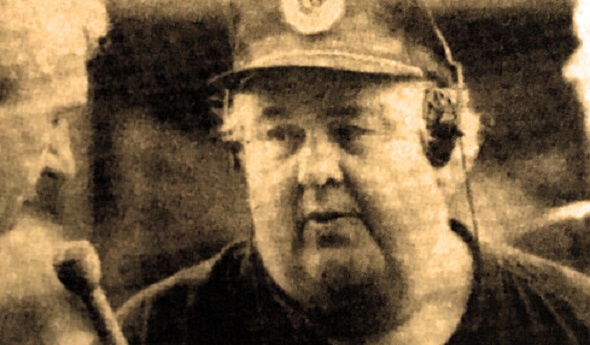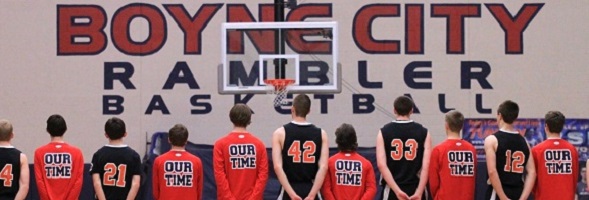
Radio Neighbors Begin 77th Years in HS Sports
September 6, 2018
By John Johnson
MHSAA Director of Broadcast Properties
Local radio coverage of high school sports can still be found in a lot of places these days – and for a couple of stations, they’re celebrating 77 years of service to school sports in 2018-19.
WTCM-AM in Traverse City and WJMS-AM in Ironwood are literally adjacent on your radio dial, but they’re 250 miles apart as the crow flies across Lake Michigan and through a lot of northeast Wisconsin. In 1941, they started their streak of broadcasting the preps into their local communities.
Mind you, there weren’t that many radio stations as you might think back then, when it was the only electronic medium. WJMS had signed on in November of 1931 and was only one of two stations in the Upper Peninsula at the time and one of 19 statewide, according to Federal Radio Commission records. One of the early issues the station faced was interference with its signal because of the density of iron mines in the area.
When WTCM went on the air early in 1941, there were still only 28 radio stations in our state; five were in the U.P., and WTCM was the only station in the Lower Peninsula north of Saginaw.
Les Biederman owned WTCM and was quickly persuaded by the locals to broadcast a Traverse City High School basketball game.
“So he got the equipment ready and got everything set up, they got permission and everything,” said Jack O’Malley, current program director at the station and a long-time play-by-play voice. “The night of the game, the superintendent says ‘You can’t do the game – the local newspaper is not real happy. They said if people listen to the game, they won’t buy the newspaper in the morning. So you can’t do the game.’
 “So the town had already been told – they were promoting it; and when 7 o’clock rolled around, they went on the air and they announced they were going to do the game tonight, but permission had been revoked, so we can’t do it. And then they left the microphones open at the gym so that everybody could hear the basketball dribbling, the crowd cheering, the horns honking.
“So the town had already been told – they were promoting it; and when 7 o’clock rolled around, they went on the air and they announced they were going to do the game tonight, but permission had been revoked, so we can’t do it. And then they left the microphones open at the gym so that everybody could hear the basketball dribbling, the crowd cheering, the horns honking.
“About 15 minutes later, the superintendent was at Les’ door, saying that the phones had gone crazy, you’ve got to do the game. They started with the game and we’ve been doing high school sports ever since.”
WTCM added football and other sports to the mix over time, which played well with Traverse City High School being the only public school in town. The station’s focus these days is football, alternating between Central and West High Schools.
“The whole idea is that we’re part of the community, and WTCM has always been a community radio station,” O’Malley said. “High school sports are all about community. People say, I remember when this kid played on that team and you watch all the kids as they grow up. It’s really a connection through the ages.”
The Biederman family continues to serve radio listeners in the north, with Ross Biederman as the president of what has become the Midwestern Broadcasting Company with four stations in the Traverse City market and two in the Alpena area. And yes, one of the Alpena stations is involved in covering high school sports.
The paper trail isn’t quite as tidy when documenting the history at WJMS. The station moved from its original frequency of 1420 to 1450 after being on the air for about six years, then to 630 in 1947 and its present 590 on the AM dial in 1968. Veteran observers of U.P. radio concluded that WJMS began broadcasting high school games in 1941, which was confirmed by several newspaper articles in the old Ironwood Times from that year.
The station’s signal footprint, which would eventually reach from Marquette to well west of Duluth, Minn., by day, was the early stomping grounds for some great broadcasters.
“I can remember when I was 9 or 10 years old, listening to Bob Olson and Joe Blake doing high school basketball and football in the early 60’s,” said Rod Halverson, who currently calls games for the station. “We had four local schools, Hurley (Wis.), Bessemer, Ironwood and Wakefield, which were all in the Michigan-Wisconsin Conference; and we covered those four schools. I remember listening and seeing those guys at the basketball games.”
Bob Olson, who died earlier this year, and Joe Blake went on from WJMS to purchase WMPL in Hancock in 1969. Olson would spend 35 years behind the microphone calling Michigan Tech ice hockey games and was legendary for his high-pitched tag going into commercial breaks: “This is Huskie Hockey from Houghton!” Blake would purchase WCKD in Ishpeming in 1971 (which later became WMQT-WZAM in Marquette) and run its operations until his death in 2004, calling Northern Michigan ice hockey and volleyball games. Both gentlemen received all kinds of accolades over the years.
But it was the style of an another announcer who followed Olson and Blake – Harry Rizze – who Halverson has worked hard to apply as he calls the games now.
“Harry Rizze was doing games when I started playing basketball,” Halverson said. “He made the games really personable. He would get to know the players by their first names – and he would use their first names on the air sometimes – that’s how close he got to the program. I thought it was a really nice touch. I’m doing some of that now, and I’m trying to emulate the two guys before me – Harry Rizze and Gary Aho.”
And in a place like the Iron Range of the Western U.P., there’s nothing like local radio covering local high school games.
“Some of the players I broadcast now, I played against their dads,” Halverson said. “You get to know everybody. Up here, we cover all of the schools the best we can. I feel bad for the areas that don’t have radio coverage.”
PHOTOS: (Top) Longtime WJMS broadcaster Harry Rizze conducts an interview. (Middle) Late WTCM owner Les Biederman.

Graduation of Multi-Sport Athletes
December 8, 2014
By David Smith
Boyne City athletic director
Editor’s Note: This is reprinted with permission from the Petoskey News-Review, which is publishing semi-regular columns written by athletic directors for the northwest region of the Lower Peninsula. Click for more sports coverage from the News-Review.
There are many important topics today that relate to high school sports. I was honored when asked to write a brief column about a current topic of my choice in the high sports world. This particular topic, student-athletes specializing in one sport, is something that is happening more and more.
It’s hard to pinpoint exactly why this is, but it often times seems to boil down to unrealistic expectations from several parties that an athlete is capable of being a legitimate college or higher-level athlete.
Don’t get me wrong, we have a plethora of outstanding athletes in Northern Michigan. The facts are, however, that about 98 out of 100 high school athletes never play collegiate sports of any kind at any level. Also, less than one percent of high school athletes receive a scholarship of any kind to a Division I school.
I don’t want to tell someone not to have that dream. In fact, I think that is an awesome dream to have. I had that goal growing up and was fortunate to be able to play a few different sports at a small Division III college. It helped me grow immensely as a person, and I’m very thankful for that experience. I just can’t emphasize enough how we need to all have realistic expectations for our student athletes, whether it’s the athletes themselves, or parents, coaches, administrators, etc.
I think one thing we can all do to help this is to emphasize the process more than the outcome. The funny thing is getting the process right and enjoying it almost always leads to positive outcomes. The process is where all the hard work is put in. The process is where good character is developed, and that’s one of the most important traits we can help young individuals develop.
Many high school athletes are also too busy and compete too much. The amount of young athletes competing year-round for sports is getting out of control. Sure, sometimes it works out and an athlete will really improve by doing this, but more often than not, they get burned out and when it’s actually that sport in-season, they are toast and go through the motions. I know from a coaching standpoint I want athletes hungry to compete every time out.
Being that busy also means very little time for athletes to improve their overall athleticism (stronger, faster, quicker, more explosive, better endurance, etc.). Skills take a back seat too because most athletes are just playing games and not focusing on skill work. I’d rather take an athlete who trains to become more athletic and works on skills for several months than one who plays AAU or something of that nature. I know that has its place for a very few individuals, but most young athletes need way more work on their athleticism and skills before being ready for something like AAU.
I get specializing in one sport if you are undoubtedly a Division I athlete that will likely play professionally. Or maybe it’s someone who goes to a big high school and they aren’t very talented so the only way they can play is to focus really hard on one sport. I get those occurrences.
I would argue, however, that even the Division I-type individuals will nine times out of 10 benefit more from playing another sport because they aren’t going to work hard enough by themselves to make the gains. They would then also be refreshed and ready to get after it once the season arrives. With that, our schools up here will always have a hard time competing at the regional and state level if we don’t have all of our best athletes playing two or three sports. It blows me away how good some of our teams in the area could fare if this happened.
This column is not meant to be negative. It’s just some food for thought. I haven’t been at this very long, but it’s something I’ve seen happen more and more in the last 10 years. I’ve just always been a big fan of the multiple sport athlete and experienced first-hand how much a school can benefit when a group of talented athletes go through and they all play a minimum of two sports.
At the end of the day, we cannot forget what I’d consider the main purpose of athletics at this level. That is, to help young individuals leave our schools with experiences and life lessons that will help them as they pursue careers and go on with other facets of their lives.

